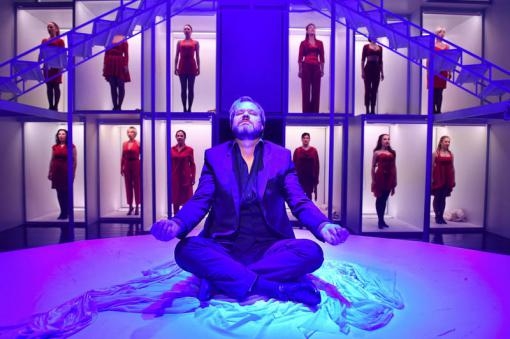The musical Nine, based on the legendary film 8½ by director Frederico Fellini, was prepared under director Stanislav Moša as the penultimate premiere of the season at the Brno City Theatre. They prepared an at places almost erotic show, led by interesting scenography, well-made costumes, brilliant musical preparation and the energy of the female acting. The sensuality of some of the dance parts thankfully did not overshadow the central theme of the hero’s crises: mid-life, art and relationship.
As the main and only male role is the director Guido Contini, who finds himself at both a life and professional crossroads, surrounded by two dozen women colleagues. Contini is to direct a film, but he has no idea about the topic, thinking much more of women. Nine is actually a musical pastiche of Fellini’s part-autobiographical film 8½, from 1963. The musical version from 1982 is the work of the American author, renowned composer and musicologist Maury Yeston, who is frequently featured in the programmes of the Brno City Theatre. Their repertoire includes his Titanic, followed next season by his musical, Grandhotel. Yeston says that he added the half into the name Nine for the music he wrote for the story. Viewers know the musical, filled with hits and grand dance numbers from the star-filled film edition, created in 2009 by director Robert Marshal.
But back to the Brno production. I view the scenography of Christoph Wevers as its great asset, to a certain degree being the key to the production for the audience. Its backdrop is made of 24 boxes, like the number of Contini’s fateful women. It is however not only about the effective distribution of the actresses, who stand on three floors above each other. All of these women in red (red being the colour of sex, lust, sensuality and want, which are the motifs) actually create a mosaic above the protagonist, a female universe constantly running through his head. It is also a successful scenic solution to the original material of the story, where reality is often mixed with the hero’s memories, old and new, and the viewer sees the parallel workings of reality and the hero’s dreams in some sort of watchful dreaming. Thus, Contini can be talking with his mother, bearing down upon him from a kind of godlike perspective or can be in contact with his attractive lover, Carla, while at the same time speaking with his wife Luisa. Moša uses Wevers’ imaginative scenery not only for the effective moving of the ladies in this great living clockwork, but also often works with the shadow-play of female silhouettes or with lighting and projections. The red costumes by Andrea Kučerová, who worked with many variations of the Italian chic style from the sixties to the modern age, are very accurate. The gentlemen in the audience will certainly be pleased by the amount of garters, panties and bras, not matched by any other local production. Some of the more conservative viewers may be surprised by the ostentatious erotica of certain dance performances (you can guess what the scantily dressed dancers pretending to be maids implied with broom handles and dusters, on another occasion even with a tambourine), but thankfully the provocativeness stays at a certain level and doesn’t turn into a cheap erotic show. Choreographer Michal Matěj was inspired by other famous dance performances, and the ensemble performance of the ladies with the large feather fans was one of the viewer’s highlights of the evening.
A welcome bonus to the evening is the accomplished and fast-paced musical preparation by Dan Kalousek and Ema Mikešková, which highlights the quality of the musical material, offering almost hit musical songs, in places soul and chansons, a fast tarantella and surprisingly also a quotation from a baroque opera, which sound out here with great musical and vocal bravado. 33 musical parts with orchestral accompaniment and complicated dance performances make up an hour and a half out of the two-hour length of the play, so it is certain the you will enjoy all the music you could wish for.
The story of the musical Nine takes place in contemporary Venice and the director Moša wanted to create, in his own words, an adventurous comedy with an erotic charge. The main protagonist constantly staggers between dreams, reality and his own past. Guido Contini however, as played by Petr Gazdík, in the end presents his doubts in an unnecessarily agonising and melodramatic way. One can imagine a far more tragicomic portrait of a man run down by dozens of women, professionally burnt out and blundering after the solid point and shape of his life. A more farcical take would maybe add a little more truth to this story of a lost man.
You will also enjoy the procession of women’s fates. Whether it is the confident and not overly lascivious Dagmar Křížová as the lover Carla or the comically precisely drawn mother, Lenka Bartolšicová, who oppresses her son with motherly love. Markéta Sedláčková as producer Liliane went for an almost operetta-style caricature of a female figure, her main vocal performance Folies Bergéres being one of the highlights of the evening. It is impossible to name everyone, since all the roles in the musical are played by two alternating actors, so I am very sorry for not naming the second in each case.
The Brno musical Nine is, all in all, a skilful show, which will please many men’s eyes and ears. However, no matter what your gender, you will enjoy two hours of good fun, which, expectations notwithstanding, isn’t sad but rather a show of fast-paced, understandable and not overcrowded musical drama.
































No comment added yet..